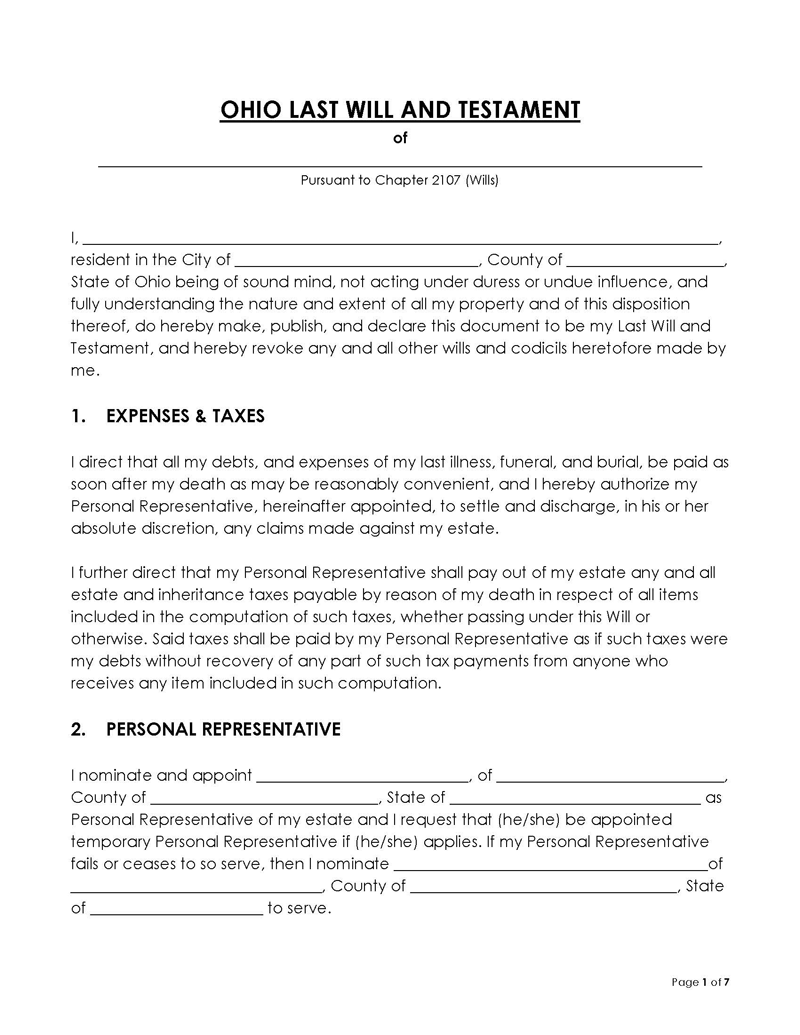Last wills and testaments (also known as a will) enable a person to grant property to their heirs or beneficiaries after death. The person who writes the last will and testament is called the testator. It provides for the disposition of an individual’s estate according to his or her wishes in the event of death. In order to be valid in Ohio, the will must be in writing, signed, and dated.
The formal term for creating a plan in advance to guide how your assets are to be distributed upon death is estate planning. The forms are an important part of estate planning in Ohio because they allow you to leave the assets you want to your loved ones while avoiding the costs and legal hassles of probate, which is based on intestacy laws. These laws may not align with your wishes regarding the distribution of property, and therefore it is advised to write a last will and testament.
In order to be valid in Ohio, the will must be in writing, signed by the testator, dated, and signed by two witnesses present during the signing. You may choose to write your own will or have one drafted by an attorney. This article provides basic information about the last wills that you can use in Ohio. It also details how to create one, who can create one, and the importance of having a will.
Free Template

Why Do You Require a Last Will and Testament in Ohio
The state of Ohio does not mandate its residents to have a last will and testament. However, having one has multiple benefits.It has many advantages, including providing comfort and a sense of security. When you make a will, you know that your wishes will be carried out and your property will be distributed as you wish. You may also want to name a guardian for your children and your estate if you have minor children.
If no guardian is appointed, the courts decide who will be the guardians of the children. You can also appoint a manager to look after your estate on the children’s behalf before they reach the age of majority. In Ohio, it also allows you to name organizations and individuals other than family as beneficiaries. It can also be used to establish pet trusts to care for any pets you leave behind. Finally, through it, Ohio residents can appoint an executor to oversee and carry out the will’s directives after death. This ensures that your wishes as a testator are carried out even if you are no longer alive.
If you pass away without a last will, the courts will make all decisions regarding your estate based on intestate laws, which may not be in your best interests. In the absence of a will, you will not be able to dictate your legacy or plan for the future. Your loved ones and heirs may have to go through court proceedings to determine how your assets will be distributed. Ideally, intestate laws prioritize your spouse and descendants as beneficiaries of the estate.
If there is no surviving spouse or child, they are followed by your parents or grandchildren. The list then goes to the next of kin, such as siblings, aunts, uncles, etc., until all blood relatives are exhausted. This process can be time-consuming, stressful, and expensive if legal representation is required. If the court determines you have no surviving relatives, the state becomes the official beneficiary.
How to Make a Will in Ohio
You can draft your own last will and testament in Ohio, use a template, or retain the services of a qualified attorney. Regardless of the approach taken, the following steps can be used to prepare the document:
Step 1: Check eligibility and requirements
The eligibility of the testator is the first aspect of a valid last will that ought to be considered. The requirements of an eligible testator can be found in Ohio Rev. Code § 2107.02. The requirements are that no one under the age of 18 can create a valid last will. The testator must also have the mental capacity to sign documents legally. This means you should be able to understand the terms of the document, the nature, and extent of the property being distributed, and make rational decisions on sensitive issues like appointing a guardian for minors. You must not have been judged incompetent by any court, nor should you be under the guardianship of any other person.
Step 2: Consult with state laws
The testator must also be mindful of the laws of the state of Ohio when creating a last will and testament. Applicable state laws are provided under Ohio Revised Code Title XXI Probate— Juvenile Chapter 2107 Wills. The last will must also satisfy the definition provided under ORC 2107.01. This statute declares that the definition of a will is inclusive of all codicils to a will used for lost, destroyed, or spoiled wills. Additionally, any written instruments are also valid under division (A)(1) of section 5817.10 of the Revised Code. The term “will” does not, however, include inter vivos trusts or other instruments that have not been admitted to probate.
Step 3: Choose your will executor
It is critical to select an executor to oversee the distribution of your estate after your death. It is recommended that you appoint your most trusted person as the executor of your will, who is at least 18 years old and of sound mind. This is because of the sensitivity of their functions, which include paying debts, filing taxes, and ensuring each beneficiary receives their rightful portion of the estate. Due to the complexity of the laws governing non-resident executors, it is advised that you select an Ohio resident as your executor.
Step 4: Execute your will
Next, execute your will in the state of Ohio by undertaking the following:
- By signing and dating each and every single page that is witnessed by two oaths, both parties being legal adults (at least 18 years old) in accordance with ORC 2107.03. The witnesses should be able to ascertain that the testator initiated the will willingly and not under duress, coercion, improper persuasion, or restraint.
- Ensure your will is in writing and identifies the testator’s name, address, county, and state and be signed with their name as well as those of the two witnesses. This implies that the will ought to be on paper. Digital wills are not legally enforceable in Ohio. However, nuncupative or oral wills are accepted in Ohio under specific circumstances, such as the last minutes before dying, where it would be impossible to craft a written last will and testament.
- Witnesses of the last will in Ohio should not be beneficiaries of the will. If so, they should relinquish their “benefits” under the last will.
- Testators can also self-prove the forms in Ohio. By using a self-proving affidavit, you can make your will a valid last will in Ohio. Make sure to include the county’s seal or stamp.
note
The testator should be aware of the property that can and cannot be disposed of using a last will and testament. Examples of properties to leave out of the will include proceeds from life insurance and retirement accounts (which go to the beneficiary named in the policy or account), property owned under a joint tenancy (which goes to the surviving account holder), and the elective share of the surviving spouse.
How to Revoke or Change a Will in Ohio
Revocation of last wills is allowed in Ohio. However, it must be done legally in order for the current last will and testament to continue to be in force. A will may be revoked in Ohio in one of two ways: by making a new will that expressly revokes the terms of the old one, or by physically destroying the old one by burning, tearing, canceling, or erasing it. You can do so yourself or order a third party to do it in your presence.
In Ohio, you can also change provisions in your last will by either inserting a codicil or amendment or revoking the will in its entirety. Note that changes in your marital status can affect provisions in your last will. Upon divorce or marriage invalidation, Ohio state laws automatically revoke any will provisions that name your spouse as a beneficiary or as an executor. The only exception is if the last will clearly states that changes in the marital contract do not affect provisions of the will under Ohio Rev. Code § 3107.33.
Ohio’s Laws of Intestacy and Probate
If there is no will specifying how your estate should be divided after your passing, intestacy laws take effect. The Ohio Revised Code gives specific guidelines for the distribution of property in scenarios where there are no wills.
It provides that the estate should be distributed in the following order:
- If the testator is married with no children, then the spouse inherits the entire estate.
- If the testator is married with children shared with the same spouse (biologically or adopted), then the spouse inherits the estate.
- If the testator is married and has children outside that marriage, the spouse receives a third of the estate, and the descendants receive the remaining portion.
- If the testator is unmarried and has kids, the kids inherit the entire estate.
- If the testator has no spouse or children, the estate is inherited by their parents, followed by siblings and then the subsequent close relatives. If there is no surviving relative, the state of Ohio inherits the estate.
In Ohio, all estates must go through probate court before they get distributed among the beneficiaries. All estate distribution must be fair and open, and that is the responsibility of the probate court. This process begins after the death of the testator. In Ohio, the executor or a family member ought to file the last will and testament as soon as you die. In Ohio, there is no state-mandated deadline for filing the will; however, there are penalties for failing to do so.
The probate court then validates the will and appoints an executor (if one has not already been appointed) to distribute assets in accordance with the wishes expressed in the last will or intestate laws, as applicable. The executor is in charge of gathering your assets, valuing them, and notifying creditors and other authorities. According to the law, the executor acts as an agent of the court and is subject to its jurisdiction. After distributing all assets according to the will, the executor notifies beneficiaries of the estate’s closing to ensure everyone receives their due.
A testator can name anyone as a beneficiary. Beneficiaries may include not only spouses, children, siblings, parents, grandparents, cousins, uncles, aunts, nieces, and nephews, but also organizations such as charities.
Frequently Asked Questions
No, you do not need to notarize your will. It is a good idea, however, to ensure that your signatures, as well as those of your witnesses, are certified by at least one of Ohio’s public notaries.
Holographic wills are legal in Ohio if they are handwritten and signed by you and two witnesses. They must also comply with all the legal requirements of a valid will in Ohio.
No, Ohio does not collect estate tax or inheritance tax. However, testators from other states ought to check their state laws in this regard, as these taxes may be applicable.
You do not need to hire a lawyer, but it is recommended that you have one. However, making your own last will is not a hard job, and you can do it yourself. If you prefer to draft a last will and testament by yourself, read Ohio’s laws carefully and keep a record of all your assets, as well as their value, before making any distribution decision.
If you want someone to manage your last will and testament, it is wise to name an executor. Make sure the person is trustworthy and capable. If you are unable to distribute assets equally among your heirs, the executor can divide the estate among them.
In Ohio, you cannot make a digital will. This is because it is a legal requirement that all valid last wills and testaments in Ohio be signed and acknowledged in the “conscious presence.” The state defines “conscious presence” as being within range of any of the five senses, except sound and sight generated by electronic communications devices.












